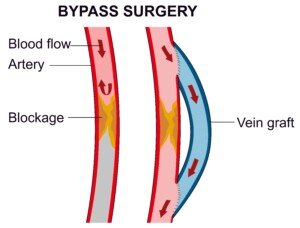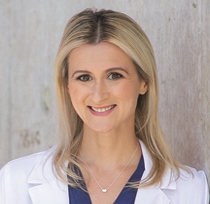Have you had coronary bypass surgery and are now wondering if you can get away with eating junk food or if this will wear out your new grafts faster?
CABG stands for coronary artery bypass graft.
For many CABG procedures, a vein is harvested from the patient’s leg and grafted onto the diseased coronary artery for blood to pass through as it bypasses the clogged artery.
The image below depicts this very common and revolutionary procedure that is one of the greatest medical advances of all time.

Shutterstock/oleil Nordic
You might be thinking, “Hmmm, with these fresh new vessels in my heart – all nice and free of sludge – I can now eat all the junky food I want since it takes many years for plaque buildup to occur.”
Well, hold your horses. Not so fast here. Your heart’s new plumbing is not a pass to eat mindlessly, even if you’re of a healthy body weight.
Can a bad diet hasten wear-and-tear on coronary bypass grafts?
“Yes, absolutely,” says Alexandra Kharazi, MD, a cardiothoracic surgeon with CVTS Medical Group, Inc., Chula Vista, CA.
“Grafts are subject to deterioration, much like native coronaries,” continues Dr. Kharazi.
“The patency of vein grafts is lower than arterial grafts, such as the LIMA [left internal mammary artery – a common harvesting source, located near the breastbone], and this has to do with flow dynamics.”
Arteries are just naturally tougher than veins.
“Vein grafts are usually readily available and easy for us to harvest,” continues Dr. Kharazi.
“I often tell my patient that the same things which lead to native coronary disease will also affect the bypasses.
“A bad diet can precipitate plaque buildup in the same way. In a lot of ways, the vein grafts are even more susceptible to these changes.
“We know that vein graft patency is only about 50 to 60% of 10 years.
“However, controlling risk factors such as smoking, HLP [high blood fats], DM [diabetes mellitus] and HTN [hypertension or high blood pressure] will optimize vein graft patency.
“Not smoking is also crucial, and lifestyle changes such as a low fat, low salt diet are an integral part of staying healthy after CABG.”
So, just like a junk food diet, or a lot of highly processed foods, can clog up the natural arteries that one’s heart comes with, they can also wreak havoc on the less sturdier vein grafts.
This process will take faster, too. Thus, even if you’re 80 with new plumbing in your heart, it’d be all the worthwhile to stick to as natural a diet as possible, restricting your intake of ultra-processed foods and managing sodium consumption.




























